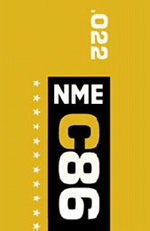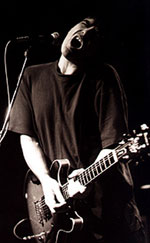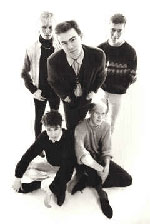C86 | |

| I never liked C86 as an epithet. I didn't like it much in 1986 and I liked it even less when it became apparent, a decade or so later, that some were using it as means of describing a generic sound or scene. Because it was never a scene, at least certainly not in 1986. It wasn't really even a sound. As far as I was concerned it was just a disparate collection of bands that happened to wield guitars rather than drum machines and turntables, gathered on one give-away tape. Because wasn't it really just some kind of kick-back constructed by one faction of NME journalists during/after the Hip Hop Wars? And as we all know, you should never trust journalists. Of course it was tempting to make connections that didn't really exist between groups. It was, and is, what makes music journalists tick, after all, whether they write for the major music press or make fanzines for their friends. The need to fabricate or over-expose scenes, to which we then like to consider we belong, is intrinsically Pop. Because Pop and Rock is all about the sense of belonging, and ironically of course also about the sense of elitism and isolation. And you don't get much more elite than bands that sell a thousand records to the same thousand people, after all. Not that there were no connections. Some of the groups no doubt shared influences, geographical location and perhaps even a record label. Or maybe the record label bit came later, when the cashing in came along. I don't really know. Certainly some shared mutual respect, or perhaps at least mutual contempt. It was all terribly tied up in the context of the era too. It was a time of deciding what side of lines and fences to stand. Politics still seemed to matter, and 'the kids' still seemed to care about ideology. Some took this to ludicrous extremes and mistook the medium for the message, making out like the 7" single per-se was Good and the CD Bad, but that was understandable because many of us were indeed young and stupid. Looking back now, it's difficult to understand or communicate just what it was really like; how much antagonism there really was, and how fiercely people held certain beliefs. And how silly and inconsequential some of those seem now, particularly when you lose sight of the bigger picture of how those little rebellions were metaphors for much larger struggles. Some say the '80s was the time of the real birth of post-modernism but really it now feels more like it was the final throws of ideologies clashing. It feels like it was only after those ideologies lay down and died that Post Modernism could come through triumphantly to reign in the laissez-faire '90s. Some talk about how in the early '80s there was a lot of discussion in the pop underground about what directions should be taken next. Some wanted to see intriguing angles and juxtapositions, following the post-punk avenues of explorations that had led the likes of Vic Godard into strange Radio Two territory, or that had led to the jubilant Dexys meets the Velvets assault of the June Brides. Others seemed more content to stick to guitars and follow what they thought was a path laid down by '60s acts like The Byrds, Beatles or Syd Barrett. Except of course that largely they stumbled whilst on that path and fell face first in the mire of uninspired mush and went off half-cocked. |

| I remember someone, it might have been Pete Williams of the great 'Baby Honey' and 'Searching For The Young Soul Rebels' fanzines, saying how much he hated all those bands who said they were influenced by the Byrds when really what they meant was that they were influenced by the Byrds via Edwyn Collins. Which wasn't a criticism of Collins, just a note that these groups were not really taking the time to really listen to the Byrds and understand just what made them special. It was an interesting complaint, and one that I only half agreed with; Pop, after all, being at least partly about warping influences to your own needs and being wary of received wisdom. But it was certainly true that so many simply seemed to take a jingle jangle McGuinn guitar sound and do nothing of note with it. Then there was the line that said many of these C86 bands were following the path laid down by the Postcard groups like Josef K or Orange Juice. It was often said I think about The Wedding Present, and I'm sure I made the same mistake once or twice at the time. Really though none of the C86 groups made real connections with Orange Juice because none of them seemed to have that love of Disco and Funk that the OJs or Josef K did. Instead they just focused on the guitar sound. Which would have been fair enough, had they only added something else of interest to their anaemic recipe. Not that the Wedding Present didn't sound great; they did. They just didn't have the femininity of the OJs, or at least their androgyny. The Wedding Present were instead hugely masculine, musically brutal, although they somehow tempered that with Gedge's strange lyrics that in fact opened up the contradictions of being male. So that the Wedding Present were both strong and sensitive in the same moment, were so passionately aggressive that they would break themselves open and wear their bleeding hearts on their sleeves. And really, musically, they were much more in tune with the American speed-punk bands like the early Husker Du or Big Black, which was more reason for some to hate them, but that's another story tied into the idea of taking sides and making stands. |

| Not many of the bands that appeared on C86 ended up making anything of great significance, and maybe that's no surprise. Primal Scream of course morphed themselves in odd, natural ways over the next fifteen years to make some of the greatest records ever, but that's about it really. Shop Assistants made two of the finest Pop singles ever in the year or so that followed; Close Lobsters similarly made a couple of cracking edgy albums before dissolving into the USA; Miaow swiftly collapsed, leaving Cath Carroll to go onto make the wonderful England Made Me and most recently The Gondoliers of Ghost Lake; Age of Chance threw striking poses in cycling jerseys and made a couple of equally striking singles that threw the whole punk/disco/club interface into the mix before they disappeared leaving others to make a mint mining the same veins into the '90s. And actually, maybe those things are as much 'significance' as anyone really needs. And then of course there were Wolfhounds and McCarthy, two bands that seemed to follow the same paths almost as though they were Siamese Twins. From pillar to post they dodged between labels; from Pink to September to Midnight Music they rattled through the tail end of the '80s, leaving behind them a steady stream of classic singles and albums, each one criminally ignored. And really too both bands suffered hugely for being lumped in on the C86 tape, tagged as janglers when in fact they were so much more. Both bands had politics (and Politics) fermenting in their records, although it was McCarthy who were most transparent about it, with amazing Pop songs full of intelligent character based lyrics that often left the casual listener confused as to what the real message was. Not that it was too difficult to get, of course, and it was no real surprise to know that the band sported connections with the Revolutionary Communist Party. Wolfhounds were less obvious in their political leanings, although they seemed equally serious and passionate. Maybe even more so, in an abstract way, their noise speaking volumes that perhaps lyrics alone could not. Musically, McCarthy were somewhere between the Pet Shop Boys and Pet Sounds, whilst Wolfhounds were more muscular, angular and dynamic. They started off sounding like The Fall and ended up sounding more like Dinosaur Jr or Husker Du. At the time, however, there were younger upstarts doing the same thing, and whilst they did it with much less style and passion they had freshness on their side. They were not tainted by the curse of C86. If the NME journalists of the time had only shown the same levels of wisdom and insight as their forebears of five years previous (when the same paper, in conjunction with Rough Trade, put out the genuinely fascinating and inspirational C81), then C86 could have been a terrific showcase for the diverse and inspired underground music of the mid 1980s. Instead they laid the foundations for the desolate wastelands of what we came to know by that vile term 'Indie'. What more reason do you need to hate it? © 2002 Alistair Fitchett This article was written for Andy Royston's excellent Wolfhounds website. |